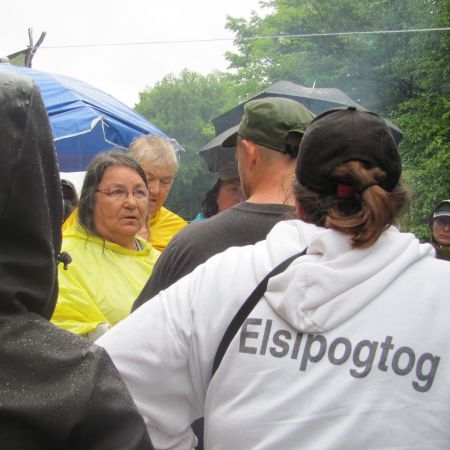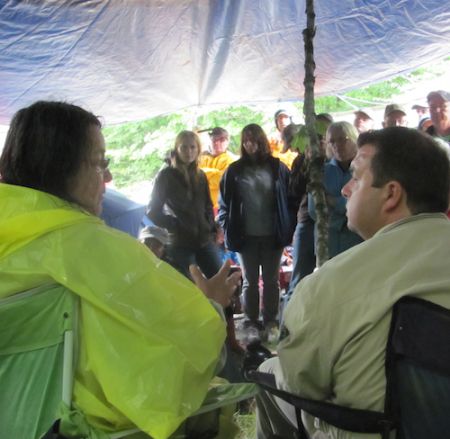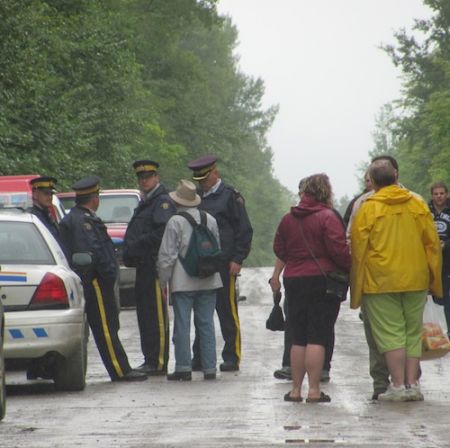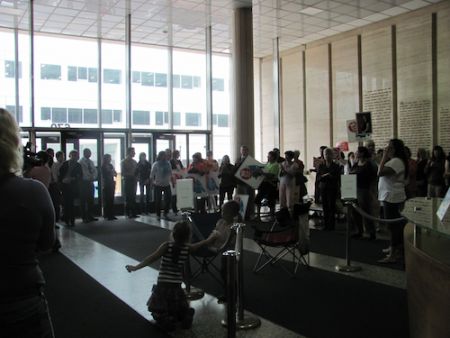Thursday, 11 August 2011
Stanley/Fredericton - A two-day blockade of SWN Resources' seismic vibrators on Route 625, a dirt road north of the village of Stanley, ended after supper time yesterday, August 10th. Worry of arrest and concern over strategy weighed heavily on the minds of the blockade participants as they discussed whether to continue or halt the blockade. As rain poured down, participants, including many who stayed overnight in tents, are mostly in favour of discontinuing the blockade because they feel they have made their point that the opposition to shale gas in the province of New Brunswick is serious. They plan to take their opposition to the politicians and grow the anti-shale gas movement.
"We should be proud of what we've accomplished here today," says Susan Levi-Peters, former chief of Elsipogtog. "We have come together, natives, francophones and anglophones to oppose this industry."
An immediate demand of the blockade participants was to have a meeting with Conservative Premier David Alward at the blockade site. The Premier refused. Visiting the blockade in his stead was York North MLA Kirk MacDonald. Before the announcement that MacDonald was on his way to the blockade, the shale gas opponents had already decided in a round circle meeting to discontinue the blockade.
MacDonald arrives at approximately 5:00pm with a bag of food for the blockade participants. He is greeted with a cautious applause by participants. MacDonald is seated next to Maliseet elder Alma Brooks, Sandy Brewer of Stanley and two RCMP negotiators. Over 50 blockade participants gather around them while about another 50 mill around the blockade site.
Brooks begins to argue her case with MacDonald. She speaks of the importance of protecting the water and warns, "We had 1,500 people last time on the streets in Fredericton. We will be 10,000 or more next time."
"How do you drink gas polluted water?" asks one Stanley blockade.
"I have been taking your concerns to government," responds MacDonald. "People are taking time to research and become experts on this issue."
MacDonald's ongoing meetings with some of the opponents is noted while his counterparts, the government ministers responsible for oversight of the shale gas industry, Minister of Environment Margaret-Ann Blaney and Minister of Natural Resources Bruce Northrup, are criticized for dismissing their concerns while defending the shale gas industry.
Levi-Peters tells MacDonald, "We don't want these machines in Kent County. The companies say they will sue us. We will sue them if they come on Crown land. It's not their land." The crowd erupts in cheers and clapping.
"It's pure pollution and destruction of wilderness," says Vicki Oland, a woman from Durham Bridge. She is also greeted with applause when she says, "New Brunswick is looking for a new message for its license plates. It should be New Brunswick: a nature's wonder."
The drive to the blockade site through picturesque Nashwaak River Valley, a hotbed of shale gas resistance, emboldens the shale gas opponents as they view not only the local opposition marked by the number of houses with anti-shale gas signs but also what is at risk--the winding Nashwaak River, tall pines and fields of potatoes, raspberries and goldenrod. "New Brunswick is not Alberta. It's not a wasteland," continues Oland.
MacDonald seems to concur with the crowd's concerns when he says, "We were able to live thousands of years without oil and gas. We can't live without water."
A woman from the crowd responds to MacDonald's claim that he is taking their message to government, "But are you defending our message?" A man says, "If you go to government and defend us, we'll defend you! We elected you!" Another man shouts, "Run as an independent!"
In response to MacDonald's assertions that the government is putting into place regulations for the industry, Brooks says, "There are no guarantees. They're experimenting. The government can't control them."
One man questions whether the industry wrote the regulations, which mining companies have done in the past in countries like Indonesia and Guatemala. In response to a man calling New Brunswick a third world country, MacDonald says such destructive practices are actually sometimes banned in third world countries. Another man, with tears in his eyes, pleads with MacDonald to realize that their protest is huge for Stanley, normally a conservative village.
Moon Joyce, an instructor at Renaissance College in Fredericton, asks MacDonald, "What are the terms of agreement with these companies? What are the lengths of licenses in this area?" MacDonald does not know the answer to this question and others that follow from the crowd. MacDonald promises to get the answers. Looking around for someone to write down the questions, the closest person scratching down notes, this writer, is asked to send a list of questions to MacDonald so he can find out the responses for the residents.
Louise Melanson, a Fredericton teacher, asks MacDonald, "Are we bounded by NAFTA?" The North American Free Trade Agreement (NAFTA) includes proportionately clauses over exports such as energy, which many free trade critics say means that New Brunswick could be on the hook for losses incurred by companies if the province decided to reduce the original amount of exports of energy, i.e. shale gas, to the U.S. Companies have also used Chapter 11 of NAFTA to sue jurisdictions for losses in profits. Melanson is left wondering whether SWN Resources from the U.S. could sue New Brunswick if the province chose to ban or regulate the industry. She says, "It is better to cut our losses now then to lose our water."
A resident of the rolling hills of Nashwaak River Valley asks, "How close can seismic work come to our rivers, streams and brooks?" MacDonald says, "every home and water well is protected by a 200 metre set back." MacDonald says that the Taymouth Community Association has been successful in getting the Department of Natural Resources to agree to have a government official and a community representative monitor each test site as they go in. He said the work will also be videotaped.
An employee of NB Power tells MacDonald of his concerns with the impacts of seismic work on NB Power stations and sub-stations. He says that their facilities are insulated in porcelain and they have concrete foundations. He says that the problem has not been resolved at NB Power safety committee meetings.
The note taking is interrupted by a little girl asking for help to pick flowers. I help her pick a buttercup before she moves on for help from the next person, Milda Titford. Titford points to the nearest flower for the girl's bouquet then returns to demanding a position from MacDonald--yes or no to shale gas. MacDonald says he represents the people and shares the opponents' questions on the impacts of the industry but refuses to say that he will oppose the industry.
Brooks ends the meeting by thanking the community of Stanley for donating food for their gathering. Billy's Restaurant in Stanley, with an anti-shale gas sign in their yard, collected donations for food provisions for the blockade. "The community of Stanley has cooked supper for us. We will share this food and it will make us stronger," says Brooks. After inviting MacDonald to join their supper, Brooks turns to MacDonald and says, "we'll see you at the Legislature."
This morning, August 11th, shale gas opponents gathered in front of and inside the lobby area of the Centennial Building on King Street in Fredericton. Natural Resources Minister Bruce Northrup met briefly with the demonstrators in the afternoon. He refused to alter his position of support for shale gas. The meeting ended with calls of shame when he refused to meet with St. Mary's Chief Candice Paul.
This article appears originally at www.nbmediacoop.org. The Halifax Media Coop thanks our New Brunswick counterparts for sharing.






